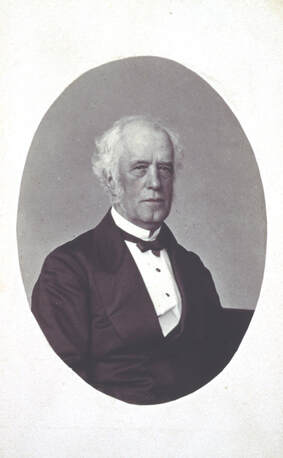Monument in Saint Davids Park
1779-1781? : William Bedford born. Location unknown. Parents unknown.
Children: Two sons. One daughter.
1821: Ordained a priest by the Bishop of London. Worked in the East End of London.
1822: Appointed assistant military chaplain for Van Diemen's Land.
1823: Arrived in Hobart Town with his wife Eleanor Martha, two sons and one daughter.
Minister at St David's Church.
His duties required much travel. He made at least one annual trip into the inland districts, was chiefly responsible for creating all the Anglican congregations in the colony and supported the subscriptions for building most of the churches in the south.
For nearly thirty years he conducted weekly services and prayers at St David's, the gaol and the prisoners' barracks. He maintained a lively interest in prisoners and gave much time to condemned men, earning Lieutenant-Governor Arthur praises for his sincerity and devotion.
Arthur lost confidence in Bedford whose well-known pecuniary embarrassment suggested dishonesty, and robbed him of popularity and weakened his ministry.
1843: The Honorary Degree of Doctor of Divinity was conferred on him by the Archbishop of Canterbury, after an Honorary M.A. had been refused.
1848: Bedford was granted six months sick leave. On his return he published a selection of psalms and hymns for general use in the churches.
1852: He continued his duties at St David's until eight weeks before his death.
His eldest son, William, was superintendent of schools in 1825, before he left to study at Cambridge; on his return in 1832 he was ordained and lived in Campbell Town.
Edward, the younger son, also studied in England and returned in 1833; as an assistant colonial surgeon he was responsible for building St Mary's Hospital in Davey Street, Hobart.
Eleanor, his daughter, became the second wife of Sir Alfred Stephen.
Bedford's personality involved him in many controversies in his long colonial service. He was dubbed 'Holy Willie' by the prisoners.
Various people have described him as combative by nature, self-confident, a liar, mischief-maker and back-biter, headstrong, indiscreet and vain, devoted to religion in the colony.
1779-1781? : William Bedford born. Location unknown. Parents unknown.
Children: Two sons. One daughter.
1821: Ordained a priest by the Bishop of London. Worked in the East End of London.
1822: Appointed assistant military chaplain for Van Diemen's Land.
1823: Arrived in Hobart Town with his wife Eleanor Martha, two sons and one daughter.
Minister at St David's Church.
His duties required much travel. He made at least one annual trip into the inland districts, was chiefly responsible for creating all the Anglican congregations in the colony and supported the subscriptions for building most of the churches in the south.
For nearly thirty years he conducted weekly services and prayers at St David's, the gaol and the prisoners' barracks. He maintained a lively interest in prisoners and gave much time to condemned men, earning Lieutenant-Governor Arthur praises for his sincerity and devotion.
Arthur lost confidence in Bedford whose well-known pecuniary embarrassment suggested dishonesty, and robbed him of popularity and weakened his ministry.
1843: The Honorary Degree of Doctor of Divinity was conferred on him by the Archbishop of Canterbury, after an Honorary M.A. had been refused.
1848: Bedford was granted six months sick leave. On his return he published a selection of psalms and hymns for general use in the churches.
1852: He continued his duties at St David's until eight weeks before his death.
His eldest son, William, was superintendent of schools in 1825, before he left to study at Cambridge; on his return in 1832 he was ordained and lived in Campbell Town.
Edward, the younger son, also studied in England and returned in 1833; as an assistant colonial surgeon he was responsible for building St Mary's Hospital in Davey Street, Hobart.
Eleanor, his daughter, became the second wife of Sir Alfred Stephen.
Bedford's personality involved him in many controversies in his long colonial service. He was dubbed 'Holy Willie' by the prisoners.
Various people have described him as combative by nature, self-confident, a liar, mischief-maker and back-biter, headstrong, indiscreet and vain, devoted to religion in the colony.
